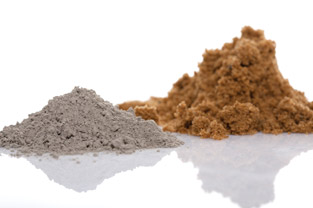
Building to Standard in Pakistan
Standardization in the Crucial Cement Sector
ASTM International has had a memorandum of understanding with the Pakistan Standards and Quality Control Authority since 2008. In a report on their nation's use of ASTM standards, the authors discuss the importance of the cement industry to its economy.
The basic raw materials of cement - limestone, clay and gypsum - are abundant in Pakistan and cheaply available to cement manufacturers. With 23 manufacturers and a total production capacity of 44.8 million tons, the Pakistani cement industry occupies an important place in the national economy through its strong links to such sectors as construction, transportation, coal and power.
Because cement is a highly freight-sensitive product, given that it is a high bulk, low value commodity, the Pakistan cement market is largely a regional one, which also means that the demand-supply dynamics may be different for the various regions and the country as a whole. None of the cement producers in Pakistan enjoys any material product differentiation because of the highly standardized nature of the product, therefore consumers usually regard price as a key determinant. Major cost components are energy and power, which constitute more than 60 percent of the cost of production and transportation. In addition to these elements, production efficiency is critical to keeping the overall cost structure competitive.
Cement and the Economy
The cement industry is one of the oldest industry sectors in Pakistan, and its percentage of gross domestic product is significant. The industry is driven by immense growth in the housing sector, infrastructure development and the construction of transportation systems. The Pakistani cement industry fulfills local demand and also supplies cement to other countries such as India and Sri Lanka. As such, the cement industry contributes to the nation's socioeconomic development. The total annual cement use indicates the country's economic growth.
Major Pakistani cement manufacturers and exporters have all made huge investments in the last few years to increase their production capability, heralding an optimistic outlook for the cement industry. The housing sector in Pakistan accounts for 45 percent of demand, a pace that is expected to continue.
Most Pakistani manufacturers produce portland cement, sulfate resistant cement, quick resistant cement, low alkali portland cement and clinker. All products are supplied either in standard packaging, in bulk or according to customers' requirements. These companies also manufacture other cement types as per ASTM International, European norms and Pakistan standards.
Conformity Assessment
The conformity assessment unit of the Pakistan Standards and Quality Control Authority certifies cement units against Pakistan Standard PS 232-2008, Ordinary Portland Cement, under the mandatory product certification scheme as per International Organization for Standardization Guide 65, General Requirements for Bodies Operating Product Certification Systems. Cement producers in Pakistan also conform to the following standards using third-party testing labs (quality manufacturing systems based on ISO/IEC 17025, General Requirements for the Competence of Testing and Calibration Laboratories) in the public and private sectors:
- Pakistan Standard PS 232-2008(R);
- ASTM International Standard C150, Specification for Portland Cement, Type 1;
- British Standard BS 12:1996, Specification for Portland Cement;
- European Standard EN 197-1/2000, Cement, CEM I 42.5N/R;
- Indian Standard for IS 12269, Specification for 53 Grade Ordinary Portland Cement, Grade 43 and Grade 33;
- South African Bureau of Standards (SABS) for SANS 50197-1, Common Cements; and
- Sri Lankan Standard SLS 107, Ordinary Portland Cement, Strength Class 42.5N.
Manufacturers maintain and enhance the quality of products and their operations using best practices; they perform quality control procedures that ensure the conformance of products in accordance with Pakistan standards. These production units' cement products also conform to ASTM International, EN and Indian standards.
Most of the cement manufacturing units in Pakistan possess sophisticated equipment to ensure that cement dispatched to customers has zero defects and exceptionally high strength that exceeds national and international standards; automatic quality control is done through online X-ray analyzer and computer controlled systems. Their focus is on quality and consistency, and quality control departments regularly check and analyze various raw materials, intermediate products and final products in preparation for additional quality checks, which are monitored by PSQCA's assessors during inspection.
Cement Standardization by PSQCA
When PSQCA analyzed the figures, it discovered that Pakistan's cement export was decreasing due to noncompliance with international standards. PSQCA harmonized the noncompliant Pakistan standards with international standards, including ASTM C109, Test Method for Compressive Strength of Hydraulic Cement Mortars (Using 2-in. or 50-mm Cube Specimens); C151, Test Method for Autoclave Expansion of Hydraulic Cement; and C204, Test Method for Fineness of Hydraulic Cement by Air-Permeability Apparatus. This removed these non-tariff barriers and facilitated Pakistani cement export around the world.
Cement testing laboratories - which receive samples from major national construction projects such as highways and bridges, power plants, and transit systems - use ASTM standards C109; C114, Test Methods for Chemical Analysis of Hydraulic Cement; C150; C151; C187, Test Method for Amount of Water Required for Normal Consistency of Hydraulic Cement Paste; C191, Test Methods for Time of Setting of Hydraulic Cement by Vicat Needle; and C204. Most of the Pakistani cement brands conform to these ASTM standards. ASTM International standards C109, C151, and C204 are currently referenced in Pakistan standards, but as per a recent PSQCA survey, other ASTM standards will be incorporated in Pakistan standards by the PSQCA Technical Committee on Cement.
Shahzad Afzal, Ph.D., deputy director general, Yasmin Khanum and Khawaja Ghulam Mohiuddin are with the Pakistan Standards and Quality Control Authority in Lahore, Pakistan. Muhammad Qasim is with the Cement Research and Development Institute in Lahore, Pakistan.
 SN Home
SN Home Archive
Archive Advertisers
Advertisers Masthead
Masthead RateCard
RateCard Subscribe
Subscribe Email Editor
Email Editor